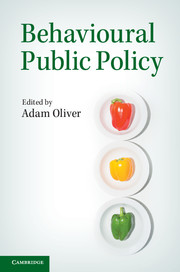Book contents
- Frontmatter
- Contents
- List of Figures
- List of Tables
- List of Contributors
- Introduction
- 1 Ambiguity aversion and the UK government’s response to swine flu
- 2 Models of governance of public services: empirical and behavioural analysis of ‘econs’ and ‘humans’
- 3 From irresponsible knaves to responsible knights for just 5p: behavioural public policy and the environment
- 4 The more who die, the less we care: psychic numbing and genocide
- 5 Healthy habits: some thoughts on the role of public policy in healthful eating and exercise under limited rationality
- 6 Confessing one’s sins but still committing them: transparency and the failure of disclosure
- 7 How should people be rewarded for their work?
- 8 Influencing the financial behaviour of individuals: the mindspace way
- 9 Decision analysis from a neo-Calvinist point of view
- Index
- References
5 - Healthy habits: some thoughts on the role of public policy in healthful eating and exercise under limited rationality
Published online by Cambridge University Press: 05 June 2014
- Frontmatter
- Contents
- List of Figures
- List of Tables
- List of Contributors
- Introduction
- 1 Ambiguity aversion and the UK government’s response to swine flu
- 2 Models of governance of public services: empirical and behavioural analysis of ‘econs’ and ‘humans’
- 3 From irresponsible knaves to responsible knights for just 5p: behavioural public policy and the environment
- 4 The more who die, the less we care: psychic numbing and genocide
- 5 Healthy habits: some thoughts on the role of public policy in healthful eating and exercise under limited rationality
- 6 Confessing one’s sins but still committing them: transparency and the failure of disclosure
- 7 How should people be rewarded for their work?
- 8 Influencing the financial behaviour of individuals: the mindspace way
- 9 Decision analysis from a neo-Calvinist point of view
- Index
- References
Summary
‘Nothing so needs reforming as other people’s habits.’
– Mark Twain‘The diminutive chain of habit is scarcely heavy enough to be felt till it is too strong to be broken.’
– simplification of Samuel Johnson quote used in nineteenth-century temperance literature‘The child is the Father of the Man.’
– William Wordsworth‘The second half of a man’s life is made up of nothing but the habits he has acquired during the first half.’
– Fyodor Dostoevsky‘Men’s natures are alike; it is their habits that separate them.’
– Confucius‘My problem lies in reconciling my gross habits with my net income.’
– Errol FlynnIntroduction
In this chapter, I explore some possible policy implications concerning habitual activities relating to health – such as eating and exercise – that have (for good reason) become the subject of social and policy debate. I do so from the perspective of economic theory, empirical evidence and with a focus on the implications of some recent research in behavioural economics.
I emphasize several themes. First, I outline a simple economic perspective on habitual behaviour. Although it also accords with common sense, reasonable psychology and empirical evidence, there is some tendency by social scientists and policy-makers to neglect this perspective.
- Type
- Chapter
- Information
- Behavioural Public Policy , pp. 115 - 147Publisher: Cambridge University PressPrint publication year: 2013
References
- 5
- Cited by

